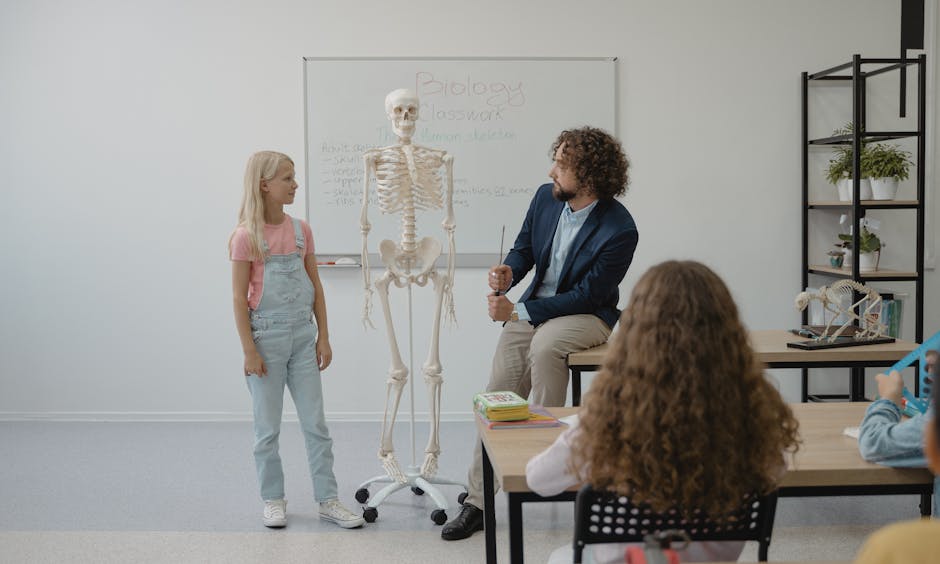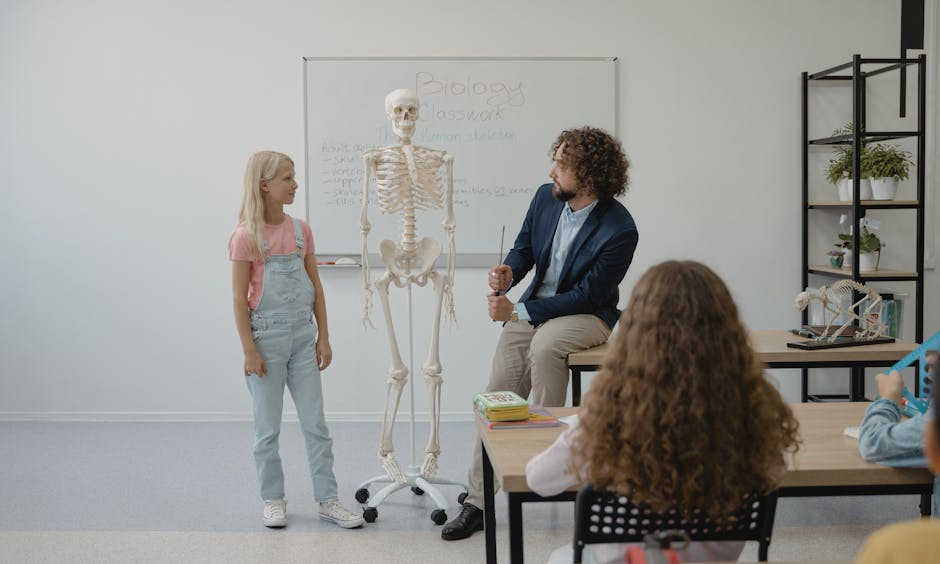Table of Contents
- Introduction
- The Importance of Continuous Education
- How to Stay Curious and Open-Minded
- Learning from Failures and Mistakes
- The Benefits of Lifelong Learning
- Developing a Growth Mindset
- Finding Inspiration in Everyday Life
- Overcoming Challenges through Learning
- Building Resilience and Adaptability
- Embracing Change and Innovation
- Q&A
- Conclusion
“Forever Learning: Unlocking the Path to Success”
Introduction
Forever Learning: The Key to Success
In today’s rapidly changing world, the ability to continuously learn and adapt is essential for success. Whether it’s acquiring new skills, staying up-to-date with industry trends, or expanding your knowledge base, the pursuit of lifelong learning is crucial for personal and professional growth. By embracing a mindset of continuous learning, individuals can stay ahead of the curve, remain competitive in the job market, and achieve their goals. In this article, we will explore the importance of forever learning and how it can unlock new opportunities and lead to long-term success.
The Importance of Continuous Education
In today’s fast-paced and ever-changing world, the importance of continuous education cannot be overstated. The concept of lifelong learning has become increasingly relevant as technology advances and industries evolve at a rapid pace. In order to stay competitive in the job market and adapt to new challenges, individuals must commit to ongoing education and skill development.
One of the key benefits of continuous education is the ability to stay relevant in a constantly changing workforce. As new technologies emerge and industries shift, individuals who are committed to learning and growing are better equipped to navigate these changes. By staying up-to-date on the latest trends and developments in their field, individuals can position themselves as valuable assets to employers and increase their chances of career advancement.
Continuous education also provides individuals with the opportunity to expand their knowledge and skill set. Whether through formal education programs, online courses, or workshops, there are a variety of ways for individuals to continue learning throughout their lives. By acquiring new skills and knowledge, individuals can enhance their problem-solving abilities, critical thinking skills, and creativity, all of which are essential for success in today’s competitive job market.
Furthermore, continuous education can lead to increased job satisfaction and personal fulfillment. By pursuing learning opportunities that align with their interests and passions, individuals can find greater meaning and purpose in their work. Continuous education allows individuals to explore new areas of interest, develop new talents, and pursue their passions, ultimately leading to a more fulfilling and rewarding career.
In addition to personal and professional growth, continuous education can also have a positive impact on overall well-being. Studies have shown that individuals who engage in lifelong learning are more likely to experience higher levels of self-esteem, confidence, and overall life satisfaction. By challenging themselves to learn and grow, individuals can boost their mental and emotional well-being, leading to a more fulfilling and balanced life.
It is important to note that continuous education is not limited to formal academic programs or traditional classroom settings. In today’s digital age, there are a wealth of resources available for individuals to continue learning and developing their skills. Online courses, webinars, podcasts, and other digital platforms offer convenient and accessible ways for individuals to pursue lifelong learning.
In conclusion, continuous education is essential for success in today’s rapidly changing world. By committing to ongoing learning and skill development, individuals can stay relevant in the workforce, expand their knowledge and skill set, and find greater personal fulfillment. Lifelong learning is not only a key to professional success, but also a pathway to personal growth and well-being. As the saying goes, “The only thing that is constant is change.” Embracing continuous education is the key to adapting to change, staying competitive, and achieving success in both career and life.
How to Stay Curious and Open-Minded
In today’s fast-paced world, staying curious and open-minded is essential for personal and professional growth. The ability to continuously learn and adapt to new information and ideas is a key factor in achieving success. By remaining curious and open-minded, individuals can expand their knowledge, develop new skills, and stay ahead of the curve in an ever-changing world.
One of the most important aspects of staying curious and open-minded is the willingness to explore new ideas and perspectives. This can be achieved by seeking out diverse sources of information, engaging in discussions with people from different backgrounds, and being open to challenging your own beliefs and assumptions. By exposing yourself to new ideas and viewpoints, you can broaden your understanding of the world and develop a more nuanced perspective on complex issues.
Another key aspect of staying curious and open-minded is the willingness to embrace lifelong learning. The world is constantly evolving, and new information is being generated at an unprecedented rate. By committing to lifelong learning, you can stay informed about the latest developments in your field, acquire new skills, and adapt to changing circumstances. Whether through formal education, online courses, or self-directed study, there are countless opportunities to continue learning throughout your life.
In addition to expanding your knowledge and skills, staying curious and open-minded can also enhance your creativity and problem-solving abilities. By approaching challenges with a curious and open mind, you can generate innovative solutions and think outside the box. Being open to new ideas and perspectives can also help you see connections and patterns that others may overlook, leading to breakthrough insights and discoveries.
Furthermore, staying curious and open-minded can improve your relationships with others. By listening actively, seeking to understand different viewpoints, and being willing to consider alternative perspectives, you can build stronger connections with colleagues, friends, and family members. Being open-minded can also help you navigate conflicts and disagreements more effectively, leading to more productive and harmonious relationships.
In conclusion, staying curious and open-minded is essential for personal and professional success. By remaining open to new ideas and perspectives, embracing lifelong learning, and cultivating creativity and problem-solving skills, you can adapt to a rapidly changing world and achieve your goals. Additionally, being open-minded can improve your relationships with others and enhance your overall well-being. In a world that is constantly evolving, the ability to stay curious and open-minded is a valuable asset that can help you thrive in any situation. So, embrace the mindset of forever learning and watch as new opportunities and possibilities unfold before you.
Learning from Failures and Mistakes
Learning from failures and mistakes is an essential part of personal and professional growth. It is through these experiences that we gain valuable insights, develop resilience, and ultimately achieve success. In fact, some of the most successful individuals in history have attributed their achievements to the lessons they learned from their failures.
One such example is Thomas Edison, the inventor of the light bulb. Edison famously said, “I have not failed. I’ve just found 10,000 ways that won’t work.” This mindset of viewing failures as opportunities for learning and growth is what set him apart from others. Instead of giving up after each setback, Edison persevered and eventually succeeded in creating one of the most revolutionary inventions of his time.
Similarly, J.K. Rowling, the author of the Harry Potter series, faced numerous rejections before finally getting her book published. She has spoken openly about how these failures shaped her as a writer and taught her valuable lessons about perseverance and resilience. Rowling’s story is a powerful reminder that success often comes after facing and overcoming failure.
Learning from failures and mistakes requires a willingness to reflect on what went wrong and identify areas for improvement. This process of self-reflection is crucial for personal growth and development. By analyzing our mistakes, we can gain a deeper understanding of our strengths and weaknesses, and use this knowledge to make better decisions in the future.
Moreover, learning from failures helps us build resilience and adaptability. When we face setbacks, we are forced to confront our limitations and push past them. This process of overcoming challenges strengthens our resolve and prepares us for future obstacles. As the saying goes, “What doesn’t kill you makes you stronger.” By embracing failure as a learning opportunity, we can become more resilient and better equipped to handle whatever life throws our way.
In addition to personal growth, learning from failures can also lead to innovation and creativity. When we are willing to take risks and try new things, we open ourselves up to the possibility of failure. However, it is often through these failures that we discover new ideas and approaches that can lead to breakthroughs. As Albert Einstein once said, “A person who never made a mistake never tried anything new.” By embracing failure as a natural part of the learning process, we can unlock our creative potential and find innovative solutions to complex problems.
Ultimately, the key to success lies in our ability to learn from our failures and mistakes. By viewing setbacks as opportunities for growth, we can develop resilience, adaptability, and creativity. As we navigate the ups and downs of life, it is important to remember that failure is not the end, but rather a stepping stone on the path to success. Embrace failure, learn from it, and use it as fuel to propel you towards your goals. In the words of Winston Churchill, “Success is not final, failure is not fatal: It is the courage to continue that counts.”
The Benefits of Lifelong Learning

In today’s fast-paced and ever-changing world, the importance of lifelong learning cannot be overstated. The concept of lifelong learning is based on the idea that learning should not stop once formal education ends, but should be a continuous process throughout one’s life. This approach to learning has numerous benefits, both personally and professionally.
One of the key benefits of lifelong learning is the ability to adapt to new challenges and opportunities. In a world where technology is constantly evolving and industries are constantly changing, those who are committed to learning throughout their lives are better equipped to navigate these changes. Lifelong learners are more likely to embrace new technologies, learn new skills, and stay ahead of the curve in their chosen field.
Furthermore, lifelong learning can lead to increased job satisfaction and career advancement. Employers value employees who are willing to learn and grow, and those who demonstrate a commitment to lifelong learning are more likely to be considered for promotions and raises. Additionally, lifelong learning can open up new career opportunities and help individuals stay competitive in the job market.
Lifelong learning also has numerous personal benefits. It can improve cognitive function, memory, and problem-solving skills, helping individuals stay sharp and engaged as they age. Additionally, learning new things can boost self-confidence and self-esteem, as individuals gain a sense of accomplishment and mastery over new skills and knowledge.
One of the key aspects of lifelong learning is the ability to learn from a variety of sources. This can include formal education, such as taking classes or earning certifications, as well as informal learning opportunities, such as reading books, attending workshops, or participating in online courses. By seeking out a diverse range of learning experiences, individuals can gain a well-rounded education and develop a broad range of skills and knowledge.
Another important aspect of lifelong learning is the ability to learn from others. This can include networking with peers in your field, seeking out mentors and advisors, and participating in professional development opportunities. By learning from others, individuals can gain valuable insights, perspectives, and advice that can help them grow and succeed in their personal and professional lives.
In conclusion, lifelong learning is essential for success in today’s world. By committing to learning throughout one’s life, individuals can adapt to new challenges, advance in their careers, and experience personal growth and fulfillment. Whether through formal education, informal learning opportunities, or learning from others, the key to success lies in a commitment to lifelong learning. As the saying goes, “The more you learn, the more you earn.”
Developing a Growth Mindset
In today’s fast-paced and ever-changing world, the ability to adapt and learn new skills is crucial for success. Developing a growth mindset is essential for individuals who want to thrive in their personal and professional lives. A growth mindset is the belief that one’s abilities and intelligence can be developed through hard work, dedication, and perseverance. This mindset is in contrast to a fixed mindset, which believes that abilities are innate and cannot be changed.
Research has shown that individuals with a growth mindset are more likely to take on challenges, persist in the face of setbacks, and ultimately achieve their goals. They see failures as opportunities for growth and learning, rather than as a reflection of their abilities. This mindset allows them to embrace new experiences and push themselves outside of their comfort zones.
One of the key components of developing a growth mindset is the willingness to continuously learn and improve. Lifelong learning is the foundation of personal and professional growth. It allows individuals to stay relevant in their fields, adapt to new technologies and trends, and seize opportunities for advancement.
Continuous learning can take many forms, from formal education and training programs to self-directed learning through books, online courses, and workshops. The key is to remain curious and open to new ideas, and to actively seek out opportunities for growth and development.
By committing to lifelong learning, individuals can expand their knowledge and skills, increase their confidence and self-efficacy, and ultimately achieve their full potential. This commitment to learning also fosters a sense of resilience and adaptability, which are essential qualities for success in today’s rapidly changing world.
In addition to expanding their knowledge and skills, individuals with a growth mindset also prioritize building strong relationships and seeking feedback from others. They understand the value of collaboration and teamwork, and are willing to listen to different perspectives and learn from others’ experiences.
By surrounding themselves with a diverse group of people who can offer support, guidance, and constructive criticism, individuals can accelerate their learning and growth. They can also build a strong network of mentors, peers, and colleagues who can provide valuable insights and opportunities for development.
Ultimately, developing a growth mindset is a lifelong journey that requires dedication, effort, and a willingness to step outside of one’s comfort zone. It is about embracing challenges, learning from failures, and continuously seeking opportunities for growth and improvement.
In conclusion, developing a growth mindset is essential for success in today’s fast-paced and competitive world. By committing to lifelong learning, building strong relationships, and seeking feedback from others, individuals can unlock their full potential and achieve their goals. Embracing a growth mindset is not only a key to success, but also a key to personal fulfillment and happiness. So, let’s commit to forever learning and growing, and watch as our potential unfolds before us.
Finding Inspiration in Everyday Life
Learning is a lifelong journey that never truly ends. It is the key to success in both personal and professional endeavors. In today’s fast-paced world, the ability to adapt and grow is more important than ever. The concept of lifelong learning is not a new one, but it has become increasingly relevant in a world where technology and information are constantly evolving.
One of the most important aspects of lifelong learning is the ability to find inspiration in everyday life. Inspiration can come from a variety of sources, whether it be a conversation with a friend, a walk in nature, or a book that sparks new ideas. By staying open to new experiences and ideas, we can continue to grow and develop as individuals.
One way to find inspiration in everyday life is to seek out new experiences and challenges. Trying new things can help us break out of our comfort zones and push ourselves to learn and grow. Whether it’s taking up a new hobby, learning a new skill, or traveling to a new place, stepping outside of our routine can help us see the world in a new light and spark new ideas.
Another way to find inspiration in everyday life is to surround ourselves with people who challenge and inspire us. By engaging with others who have different perspectives and experiences, we can learn and grow in ways that we never thought possible. Whether it’s through networking events, mentorship programs, or simply striking up a conversation with a stranger, connecting with others can help us expand our horizons and see the world from a new perspective.
In addition to seeking out new experiences and connecting with others, it’s important to make time for self-reflection and introspection. Taking the time to reflect on our goals, values, and beliefs can help us gain clarity and direction in our lives. By setting aside time for self-care and personal growth, we can ensure that we are constantly evolving and improving as individuals.
One of the key benefits of lifelong learning is the ability to adapt to change and overcome challenges. In today’s rapidly changing world, the ability to learn and grow is essential for success. By staying open to new ideas and experiences, we can develop the skills and knowledge needed to navigate the complexities of modern life.
In conclusion, finding inspiration in everyday life is essential for lifelong learning and personal growth. By seeking out new experiences, connecting with others, and reflecting on our goals and values, we can continue to learn and grow throughout our lives. The key to success lies in our ability to adapt and evolve, and by embracing lifelong learning, we can ensure that we are always moving forward. So, let’s embrace the journey of learning and never stop seeking inspiration in the world around us.
Overcoming Challenges through Learning
In today’s fast-paced and ever-changing world, the ability to learn and adapt is crucial for success. Whether it’s in the workplace, in our personal lives, or in pursuing our passions, continuous learning is the key to overcoming challenges and achieving our goals.
Research has shown that individuals who embrace a lifelong learning mindset are more likely to succeed in their endeavors. This is because learning allows us to acquire new skills, knowledge, and perspectives that can help us navigate obstacles and seize opportunities. By constantly seeking to expand our understanding of the world around us, we become better equipped to face the challenges that come our way.
One of the main benefits of lifelong learning is that it fosters resilience. When we are open to learning new things, we are better able to adapt to change and bounce back from setbacks. This is especially important in today’s rapidly evolving job market, where new technologies and industries are constantly emerging. By staying curious and continuously seeking to improve ourselves, we can stay ahead of the curve and remain competitive in our careers.
Furthermore, learning can also help us develop a growth mindset, which is the belief that our abilities can be developed through dedication and hard work. This mindset is essential for overcoming challenges, as it allows us to see setbacks as opportunities for growth rather than as failures. By viewing obstacles as learning experiences, we can approach them with a sense of optimism and determination, knowing that we have the power to overcome them through effort and perseverance.
In addition to fostering resilience and a growth mindset, lifelong learning also enhances our problem-solving skills. When we are constantly seeking to expand our knowledge and understanding, we become better equipped to analyze complex situations, think critically, and come up with creative solutions. This can be particularly valuable when facing difficult challenges that require innovative thinking and outside-the-box approaches.
Moreover, learning can also help us build a strong support network of like-minded individuals who can provide guidance, feedback, and encouragement. By connecting with others who share our passion for learning, we can exchange ideas, collaborate on projects, and learn from each other’s experiences. This sense of community can be invaluable when facing challenges, as it can provide us with the motivation and support we need to keep pushing forward.
In conclusion, lifelong learning is the key to overcoming challenges and achieving success in all areas of our lives. By embracing a mindset of curiosity, resilience, and growth, we can navigate obstacles with confidence and determination. Through continuous learning, we can develop the skills, knowledge, and perspectives needed to thrive in today’s fast-paced world. So let us commit to being lifelong learners, always seeking to expand our horizons and unlock our full potential.
Building Resilience and Adaptability
In today’s fast-paced and ever-changing world, the ability to adapt and learn continuously is crucial for success. The concept of lifelong learning has gained increasing importance as technology and globalization continue to reshape industries and job markets. Those who are willing to embrace new challenges, acquire new skills, and stay curious are more likely to thrive in the face of uncertainty and change.
Research has shown that individuals who engage in lifelong learning are more resilient and adaptable to change. They are better equipped to navigate through challenges and setbacks, as they have the knowledge and skills to pivot and find new opportunities. In a study conducted by the Pew Research Center, it was found that 87% of workers believe it will be essential for them to get training and develop new skills throughout their work life in order to keep up with changes in the workplace.
One of the key benefits of lifelong learning is the ability to stay relevant in a rapidly evolving job market. As technology continues to disrupt traditional industries, the demand for new skills is on the rise. By continuously updating their skills and knowledge, individuals can position themselves as valuable assets to employers and increase their employability. According to a report by the World Economic Forum, 54% of employees will require significant re- and upskilling by 2022 to meet the demands of the Fourth Industrial Revolution.
Moreover, lifelong learning can also lead to personal growth and fulfillment. By exploring new interests and acquiring new knowledge, individuals can expand their horizons and discover new passions. Learning new skills can boost self-confidence and self-esteem, as individuals gain a sense of accomplishment and mastery. In a study published in the Journal of Happiness Studies, it was found that individuals who engage in lifelong learning report higher levels of well-being and life satisfaction.
To cultivate a mindset of lifelong learning, individuals can take proactive steps to seek out new learning opportunities. This can include enrolling in online courses, attending workshops and seminars, reading books and articles, and seeking mentorship from experts in their field. By setting aside time for continuous learning and making it a priority, individuals can stay ahead of the curve and adapt to changing circumstances.
In conclusion, lifelong learning is the key to success in today’s rapidly changing world. By embracing new challenges, acquiring new skills, and staying curious, individuals can build resilience and adaptability to navigate through uncertainty and change. Continuous learning not only enhances employability and career prospects but also leads to personal growth and fulfillment. As the saying goes, “The only thing that is constant is change.” Therefore, it is essential for individuals to adopt a mindset of lifelong learning to thrive in an ever-evolving landscape.
Embracing Change and Innovation
In today’s fast-paced world, the ability to adapt to change and embrace innovation is crucial for success. The landscape of business and technology is constantly evolving, and those who are willing to learn and grow with these changes are the ones who will thrive. The concept of lifelong learning has never been more relevant than it is today.
Research has shown that individuals who continue to learn throughout their lives are more likely to be successful in their careers. This is because learning new skills and staying up-to-date with industry trends allows individuals to remain competitive in the job market. In a world where technology is advancing at a rapid pace, those who are not willing to adapt and learn new skills risk being left behind.
One of the key benefits of embracing change and innovation is the ability to stay relevant in a constantly evolving world. By continuously learning and growing, individuals can position themselves as valuable assets to their employers. This can lead to increased job security, as well as opportunities for advancement and career growth.
Furthermore, embracing change and innovation can lead to increased creativity and problem-solving skills. When individuals are open to new ideas and ways of thinking, they are better equipped to come up with innovative solutions to complex problems. This can give them a competitive edge in the workplace and set them apart from their peers.
In addition to the professional benefits of embracing change and innovation, there are also personal benefits to be gained. Lifelong learning can lead to increased self-confidence and a sense of accomplishment. When individuals challenge themselves to learn new skills and take on new challenges, they are able to push past their comfort zones and achieve personal growth.
It is important to note that embracing change and innovation is not always easy. It requires a willingness to step outside of one’s comfort zone and take risks. However, the rewards that come from embracing change and innovation far outweigh the challenges. By continuously learning and growing, individuals can position themselves for success in both their personal and professional lives.
In conclusion, embracing change and innovation is essential for success in today’s fast-paced world. Those who are willing to learn and grow with the ever-evolving landscape of business and technology are the ones who will thrive. By staying relevant, increasing creativity, and gaining personal growth, individuals can position themselves as valuable assets in the workplace. Lifelong learning is the key to success, and those who embrace it will be well-equipped to navigate the challenges and opportunities that lie ahead.
Q&A
1. What is Forever Learning?
Forever Learning is the concept of continuously seeking knowledge and skills throughout one’s life.
2. Why is Forever Learning important?
Forever Learning is important because it allows individuals to adapt to new challenges, stay relevant in their field, and continue to grow and develop personally and professionally.
3. How can Forever Learning contribute to success?
Forever Learning can contribute to success by helping individuals stay ahead of the curve, make informed decisions, and seize new opportunities.
4. What are some ways to incorporate Forever Learning into daily life?
Some ways to incorporate Forever Learning into daily life include reading books, taking online courses, attending workshops and seminars, and seeking out mentors.
5. How can Forever Learning benefit one’s career?
Forever Learning can benefit one’s career by increasing job satisfaction, improving job performance, and opening up new career opportunities.
6. What are the challenges of Forever Learning?
Some challenges of Forever Learning include finding the time and resources to dedicate to learning, overcoming self-doubt and fear of failure, and staying motivated and disciplined.
7. How can individuals overcome these challenges?
Individuals can overcome these challenges by setting specific learning goals, creating a learning schedule, seeking support from others, and staying open-minded and curious.
8. What role does technology play in Forever Learning?
Technology plays a crucial role in Forever Learning by providing access to a wealth of information and resources, facilitating online learning opportunities, and connecting individuals with experts and peers around the world.
9. How can organizations promote Forever Learning among their employees?
Organizations can promote Forever Learning among their employees by offering training and development programs, creating a culture that values learning and innovation, and providing opportunities for employees to share knowledge and skills with each other.
Conclusion
Forever learning is indeed the key to success. By continuously seeking knowledge and expanding one’s skills, individuals can adapt to new challenges, stay relevant in their field, and achieve their goals. Embracing a mindset of lifelong learning can lead to personal growth, career advancement, and overall fulfillment. In conclusion, never stop learning, as it is the foundation for success in all aspects of life.





